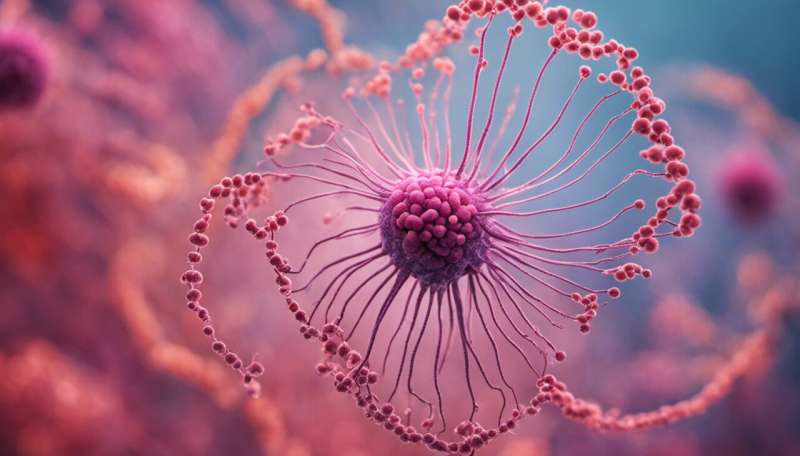Symbiotic microbe sets immune-cell levels related to colitis

(Medical Xpress)—Humans need microbes and microbes need humans, a symbiotic dance whose steps scientists are just beginning to learn.
Of the trillions of microorganisms living in and on our bodies, the microbes that make their homes in our lungs and digestive tract are beginning to reveal themselves as closely entwined with multiple body systems. In many ways, this ecosystem, or the microbiome, and the body's immune system have the tightest grip on each other in this co-evolving choreography.
A Harvard Medical School team led by Dingding An, HMS instructor in microbiology and immunobiology, and Dennis Kasper, the William Ellery Channing Professor of Medicine and professor of microbiology and immunobiology, working collaboratively with a group led by Richard Blumberg, HMS professor of medicine at Brigham and Women's Hospital, has discovered an outsized role for one intestinal microbe. Working in mice, they have shown that a molecule produced by Bacteroides fragilis controls development of the animal's immune system from a very young age, dictating for life how it responds to an experimental model of the inflammatory bowel disease ulcerative colitis.
Their results are reported in the January 16 issue of Cell.
Unlike most bacteria, B. fragilis carries a specific type of fat molecule, the sphingolipids, in its membranes, which allows the bacteria to thrive in the host. Without them, B. fragilis lose the fight for survival in the host intestine. The resilience of B. fragilis led the scientists to ask what benefit the bacteria bring to the host.
Experiments showed that the bacteria's sphingolipids control levels of an immune cell that spurs inflammation in the host. These lipids don't act directly on the immune cells, which are called invariant natural killer T cells (iNKT), but they interfere with their rapid growth. These lipids likely compete with activating host lipids for space on the molecule CD1d, whose job is to present foreign material to stimulate the iNKT cells. The binding between the bacterial sphingolipids and CD1d jams the iNKT cell activation, preventing them from proliferating in great numbers.
It might seem that when defending against invaders, the more iNKT cells the better, but the reverse is true in certain situations. Too many iNKT cells can cause the runaway inflammation that leads to ulcerative colitis. Asthma, psoriasis and atherosclerosis—conditions that fall into the autoimmune disease camp—are also characterized by immune overreaction.
"The number of iNKT cells is really critical," An said. "You need to tightly control those numbers for health."
An's experiments showed that iNKT cells proliferate very early in the development of the immune system of mice. There appears to be a narrow window of a few days during which healthy levels of iNKT cells are regulated by the B. fragilis lipids.
"It's like a thermostat set at a few days of age," Kasper explained. "Once it's set, you can't move it. It's set for life."
When the scientists tried to induce colitis in older mice that had moderate numbers of iNKT cells thanks to B. fragilis lipids, they couldn't trigger the telltale inflammation. The immune system's "thermostat" protected them.
When they tried to transplant this immune advantage into mice that lacked the sphingolipid-producing microbiome by infusing the B. fragilis sphingolipid molecule during the first a few days of life, the procedure protected them from the colitis challenge in adulthood.
Two years ago, Kasper, An and their collaborator Rick Blumberg reported in Science that microbes regulated host iNKT cell levels and function through a cell recruitment mechanism. This regulation is independent of bacterial sphingolipids. It results in controlled iNKT cell numbers in both the lung and the colon, which protect the mice from asthma and colitis experimental challenges.
Kasper also discovered another molecule in B. fragilis with the power to modulate the immune system, and published the finding in Nature several years earlier. Called polysaccharide A, or PSA, it helps to enrich in the host a kind of immune cell, regulatory T cells, priming them to release an anti-inflammatory cytokine, interleukin-10, in the presence of inflammation.
PSA seems to be a natural anti-inflammatory, Kasper said. Based on those studies in animals, it not only can prevent Crohn's disease and multiple sclerosis, but it also can be therapeutic after the onset of disease.
"We now have purified and characterized the second known example of immunomodulatory molecules produced by symbionts," An said. "Our data indicate that treatment with these molecules and molecules like them have great potential for therapeutic applications in diseases where iNKT cell activities are destructive."
B. fragilis may be among many symbionts working with their hosts' immune systems.
"I think the microbiome is probably loaded with these sorts of molecules," Kasper said.
More information: "Sphingolipids from a Symbiotic Microbe Regulate Homeostasis of Host Intestinal Natural Killer T Cells." Dingding An, Sungwhan F. Oh, Torsten Olszak, Joana F. Neves, Fikri Y. Avci, Deniz Erturk-Hasdemir, Xi Lu, Sebastian Zeissig, Richard S. Blumberg, Dennis L. Kasper. Cell - 16 January 2014 (Vol. 156, Issue 1 and 2, pp. 123-133) DOI: 10.1016/j.cell.2013.11.042
"Microbial Exposure During Early Life Has Persistent Effects on Natural Killer T Cell Function." Torsten Olszak, Dingding An, Sebastian Zeissig, Miguel Pinilla Vera, Julia Richter, Andre Franke, Jonathan N. Glickman, Reiner Siebert, Rebecca M. Baron, Dennis L. Kasper, and Richard S. Blumberg. Science 27 April 2012: 336 (6080), 489-493.Published online 22 March 2012 [DOI: 10.1126/science.1219328]




















